President Thaddeus "Thunderbolt" Ross is no longer merely a military man giving orders from the sidelines. Captain America: Brave New World promotes him to the pinnacle of leadership in the MCU. President of the United States, Ross doesn't just dictate policy; he recrafts the political landscape of a world of superpowers. Handled with smoldering authority by Harrison Ford, Ross infuses the character with a fresh level of intensity one of razor-sharp intellect married to an iron-fisted control over international events. His scenes aren't political lectures, they're war zones of tension, politics, and occasionally, jaw-dropping revelations.
Whether he's sparring with Sam Wilson on ideological lines or revealing secrets that threaten to break the superhero community, Ross demands attention in every scene. What makes his presence so intriguing is that he's not overly cartoonishly bad; he truly believes that he's the only one capable of defending the world, even if it means warping ethics and redefining rules.
This article dissects the seven greatest moments that encapsulate President Ross in Brave New World, demonstrating just how perilous, intricate, and unforgettable his presidency really is in this new chapter of the Marvel Cinematic Universe.
7 Best President Ross moments from Captain America: Brave New World
1. When President Ross Declares the Superhuman Registration Revival
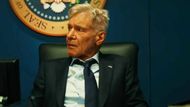
In Captain America: Brave New World, President Ross resuscitates the controversial registration debate among superhumans with a view to regulating the increasing powers and capabilities of superhumans across the globe. This is in line with his prudent political approach for ensuring national security and checking the possible threat from rogue heroes. This moment is significant with Ross skillfully walking the tightrope between enforcing the law and being a custodian of the people. The revival finds resonance in contemporary issues of surveillance and control, quietly echoing current discourse about privacy and power, and infuses his political jockeying with a topical bite.
2. The Tense Oval Office Showdown with Sam Wilson
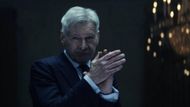
Among the most engaging moments is the dramatic showdown between President Ross and the new Captain America, Sam Wilson. Ross pinpoints Sam's ideals and forces him to adhere to government orders, laying bare the conflict between political authority and personal heroism. This scene particularly brings to the fore Ross's pragmatism and backhanded manipulation, compelling Sam to deal with the nuances of leadership beyond the realm of courage. The conflict also creates Ross's position as an antagonist whose motives spring from a desire to uphold order amidst chaos, presenting the audience with a richly developed character who is not simply evil.
3. When President Ross Forces Sam to Choose Sides
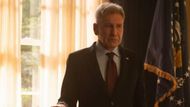
A turning point arrives when President Ross traps Sam Wilson with an ultimatum: come out fully behind the government or risk being declared a vigilante. Unlike the Oval Office confrontation, this is a more psychological, less explosive exchange. Ross doesn't scream, he calculates playing on Sam's patriotism and political leverage. The threat is in the implied danger, and Ross's awareness of how important Captain America's symbol is. It's a chilling reminder that Ross doesn't require raw strength to command heroes; he employs laws, perception, and the weight of legacy. This scene crystallizes Ross's leadership style neatly: calculated, coercive, and uncomfortably effective.
4. Ordering the Capture of a Rogue Super Soldier
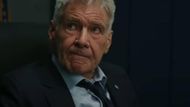
Ross's authorization of the capture of an outlawed super soldier shows his zero-tolerance approach to threats against the nation's security, regardless of the individual's might. This is a sign that Ross is ready to employ extreme actions, crossing boundaries between justice and authoritarianism. It further raises a question of moral ethics: should the superhumans be held to common law or regarded as extraordinary creatures? This scene is remarkable because it reveals the sinister aspect of Ross's plans, bringing into question freedom, control, and the trade-off for security in a world dominated by superpowered beings.
5. When Ross Uses Vibranium to Justify Military Expansion
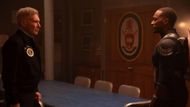
Rather than merely regulating vibranium, President Ross employs its international demand as leverage to pressure for enormous military expansion. He suggests a multi-national task force publicly presented as peacekeeping, but obviously designed to provide the U.S. with direct control over world affairs. This is chillingly strategic, as Ross employs diplomacy as a front for domination. It's not about guns, it's about clout. The scene showcases the way vibranium becomes an instrument in Ross's geopolitical gameboard, making him a global puppeteer instead of a national leader. His power to redefine control as cooperation makes him one of the MCU's most politically astute forces to date.
6. When Ross Blocks Sam’s Access to Intel Mid-Mission
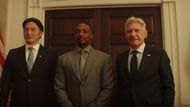
In a moment that highlights his extreme distrust of autonomous heroes, President Ross shuts down Sam Wilson's access to vital information on a high-stakes mission. Knowing that lives are at risk, Ross interrupts comms, invoking "national security protocol" when Sam won't comply with direct presidential directives. This is not merely a power play, it's a message. Ross would sooner jeopardize the mission than permit Captain America to fly solo. The setting is high tension, bureaucratic combat in the raw, illustrating Ross's compulsion to control each step. It accentuates the widening divergence between heroism and politics and stages the set-up for inevitable revolt.
7. Ross’s Mysterious Transmission to Thunderbolts
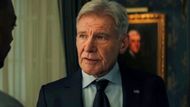
During the post-credits scene, President Ross, who is now in prison, sends a mysterious transmission alerting everyone to an interdimensional threat. This is a key moment that turns his character from a national villain to a global figure with inside information and power not publicly known. It also leaves room for Ross's possible redemption or further fall into evil, leaving spectators curious about what he will do next. The transmission lays the groundwork for upcoming MCU narratives centered around the Thunderbolts, which combine political machinations with cosmic-level stakes and promise a darker, more complicated probe of Ross's character and his influence on the Captain America: Brave New World Marvel universe.
President Ross in Captain America: Brave New World isn't merely a behind-the-scenes political player; he's a spark plug of conflict, control, and chaos in the building MCU. His actions have repercussions far greater than his office, bedeviling heroes and rattling public confidence in authority. From calculated manipulation to instances of bare-knuckle brutality, Ross reimagines what it is to be a suit-wearing villain. These seven seconds confirm he's not only another leader attempting to maintain order, but he's remaking the world in his own terms. With Phase 5 underway, one thing is certain: President Ross is just getting started, and his saga is only warming up.
Love movies? Try our Box Office Game and Movie Grid Game to test your film knowledge and have some fun!
